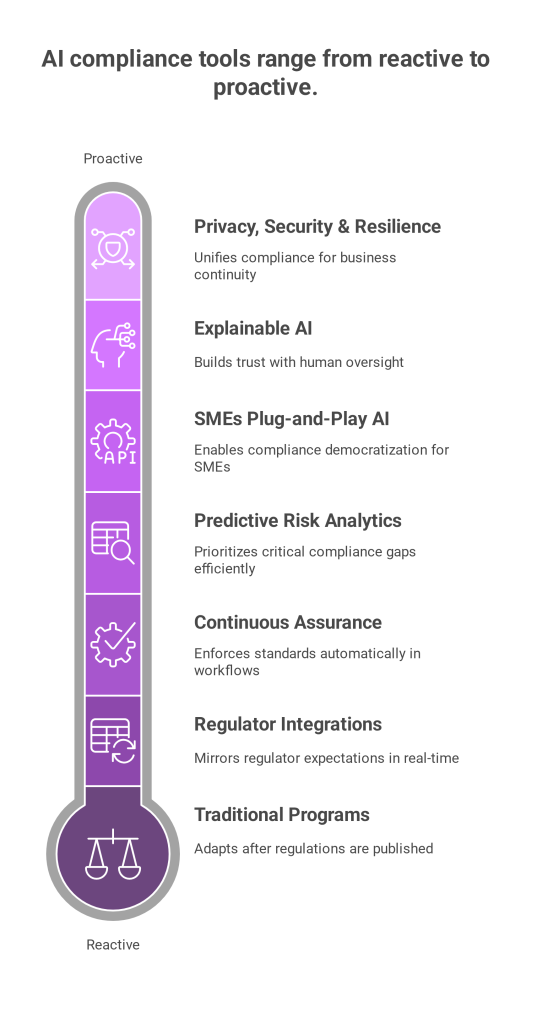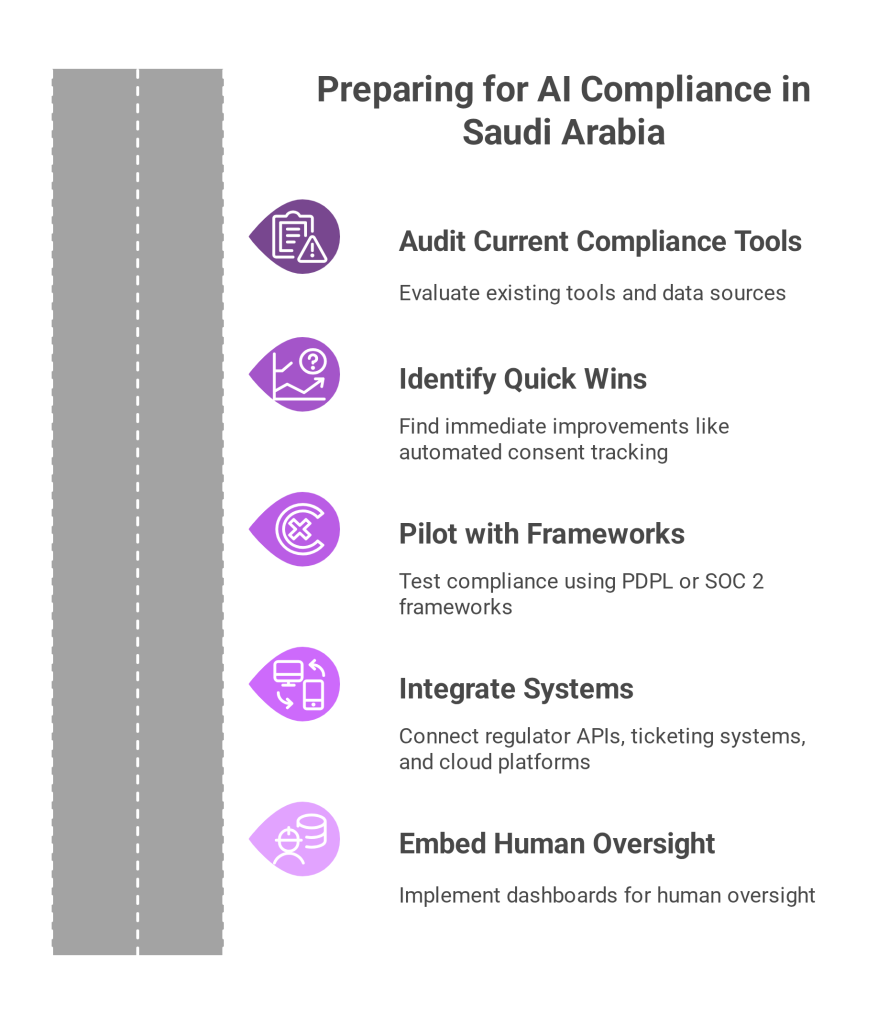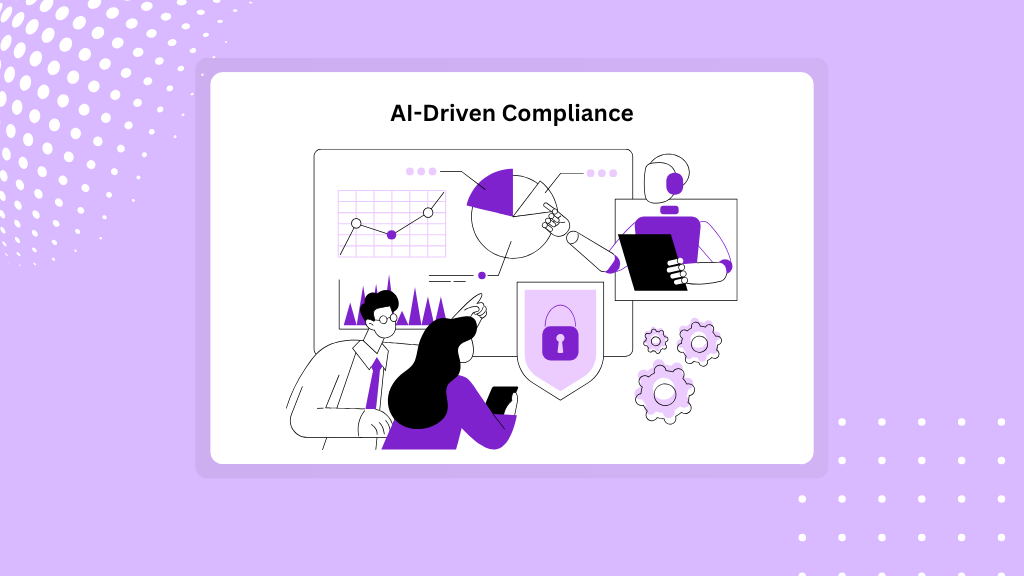As regulatory landscapes grow more complex, AI is no longer optional for compliance teams, it’s becoming the core engine driving smarter, faster, and more scalable governance. In 2025, organizations in Saudi Arabia, the wider GCC, and beyond will shift from manual compliance workflows to fully AI-driven compliance automation.
This evolution is especially relevant as regulations like Saudi Arabia’s Personal Data Protection Law (PDPL) and frameworks from SDAIA, NCA, and others grow in scope and enforcement. Below are the key AI compliance trends that will shape how businesses manage regulatory risk in 2025 and beyond.
1. Anticipatory Regulation: AI Compliance Tools that Predict Legal Changes in Saudi Arabia
Traditional compliance programs wait for regulations to be published, then scramble to adapt. In 2025, leading AI compliance platforms will proactively ingest regulatory updates, including draft guidelines from SDAIA or the NCA’s ECC framework, and translate them into actionable internal controls.
This anticipatory model means organizations can implement new policies before laws take effect, reducing lag time and legal exposure.
2. Real-Time Regulator Integrations for AI Compliance in Saudi Arabia
Regulators are beginning to release machine-readable policies via open APIs. Smart compliance tools will tap directly into these official sources, fetching real-time audit criteria, consent requirements, and enforcement thresholds.
This eliminates compliance drift and ensures your internal controls mirror regulator expectations, in real-time. The result? Fewer audit surprises and reduced enforcement risk.
3. Continuous Assurance: AI-Driven Compliance Monitoring Built Into Workflows
2025 will mark the death of the periodic audit.
Instead, compliance validation will be embedded into daily workflows. Procurement platforms will auto-reject vendors lacking PDPL or ISO 27001 credentials. HR tools will block personal data uploads that violate health privacy rules.
This shift to “compliance by design” turns every transaction into a chance to enforce standards, automatically.
4. Predictive Risk Analytics: Smarter GRC Strategies with AI in Saudi Businesses
AI will help teams move beyond checklists. By correlating internal incident data, user behavior, external threat feeds, and regulatory penalties, AI systems can rank risks and prioritize the most critical compliance gaps.
This risk-based model allows teams to allocate resources efficiently, rather than react to noise.
5. Compliance for Everyone: SMEs Get Plug-and-Play AI
Historically, only large enterprises could afford advanced compliance tools. In 2025, modular, AI-powered compliance platforms will offer pre-built frameworks for PDPL, GDPR, SOC 2, and more.
This means small and midsize businesses (SMEs) can launch enterprise-grade programs with limited teams, enabling true compliance democratization in Saudi Arabia and the MENA region.
6. Explainable AI in Compliance: Keeping Human Oversight in Saudi GRC Programs
While AI handles automation and data crunching, humans remain essential.
Next-gen platforms will include explainable dashboards, showing exactly why an alert was triggered, citing clauses, data categories, or anomalies. This builds trust in AI outputs and keeps final decision-making in human hands.
7. Privacy, Security & Resilience Converge
In 2025, compliance will no longer be siloed. AI will unify privacy laws like PDPL and GDPR with security controls from ISO 27001 and resilience requirements from NCA ECC.
This convergence reduces duplication, simplifies audits, and offers a single source of truth for compliance posture, enabling business continuity and customer trust.

How to Prepare for AI Compliance in Saudi Arabia
The future is already arriving. Here’s how organizations can start preparing for AI-driven compliance today:
- Audit current compliance tools and data sources
- Identify quick wins like automated consent tracking or log ingestion
- Pilot with PDPL or SOC 2 frameworks
- Integrate regulator APIs, ticketing systems, and cloud platforms
- Embed human oversight through explainable dashboards

Final Thought: AI is Not Just a Tool, It’s a Competitive Edge
Businesses that embrace AI-driven compliance now will not only avoid fines, they’ll win. Faster market entry, stronger regulator relationships, and higher customer trust are just the beginning.
Compliance is no longer a burden, it’s your differentiator.
📌 Learn how Sahl empowers businesses in Saudi Arabia with AI-powered compliance automation, from PDPL readiness to continuous audit assurance.



